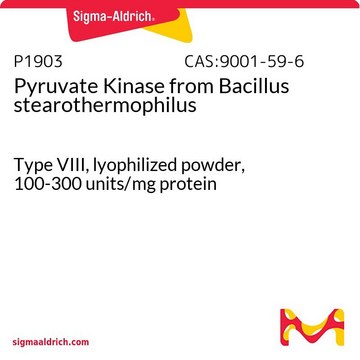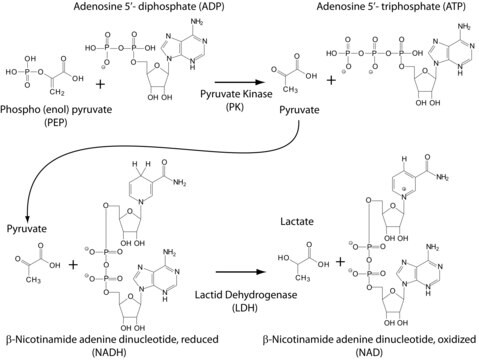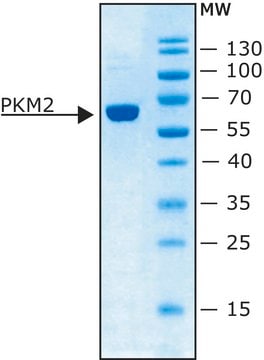SRP0189
Pyruvate kinase M2 Active from mouse
recombinant, expressed in E. coli, ≥90% (SDS-PAGE)
Sinónimos:
M2-PK tumor, OPA-interacting protein 3 (OIP-3), Pyruvate kinase 3 (PK3), Pyruvate kinase, muscle, Thyroid hormone-binding protein 1 (THBP1)
About This Item
Productos recomendados
origen biológico
mouse
recombinante
expressed in E. coli
Análisis
≥90% (SDS-PAGE)
formulario
aqueous solution
mol peso
58 kDa
envase
pkg of 20 μg
condiciones de almacenamiento
avoid repeated freeze/thaw cycles
concentración
>0.02 mg/mL
Nº de acceso NCBI
Nº de acceso UniProt
Condiciones de envío
dry ice
temp. de almacenamiento
−70°C
Información sobre el gen
mouse ... PKM2(18746)
Descripción general
Murine Pyruvate kinase M2 (PKM2) (GenBank Accession No. NM_011099), amino acids 2-end, with N-terminal His tag, MW = 58kDa, expressed in an Escherichia coli expression system.
Aplicación
Acciones bioquímicas o fisiológicas
Definición de unidad
Forma física
Nota de preparación
Certificados de análisis (COA)
Busque Certificados de análisis (COA) introduciendo el número de lote del producto. Los números de lote se encuentran en la etiqueta del producto después de las palabras «Lot» o «Batch»
¿Ya tiene este producto?
Encuentre la documentación para los productos que ha comprado recientemente en la Biblioteca de documentos.
Artículos
We presents an article about the Warburg effect, and how it is the enhanced conversion of glucose to lactate observed in tumor cells, even in the presence of normal levels of oxygen. Otto Heinrich Warburg demonstrated in 1924 that cancer cells show an increased dependence on glycolysis to meet their energy needs, regardless of whether they were well-oxygenated or not.
Nuestro equipo de científicos tiene experiencia en todas las áreas de investigación: Ciencias de la vida, Ciencia de los materiales, Síntesis química, Cromatografía, Analítica y muchas otras.
Póngase en contacto con el Servicio técnico






